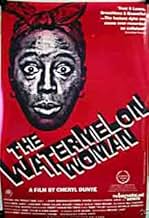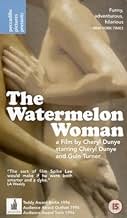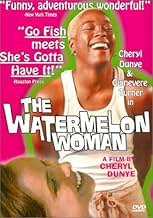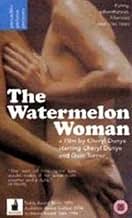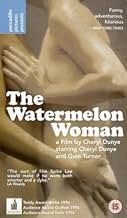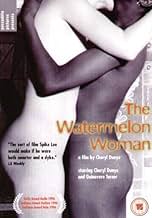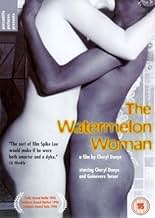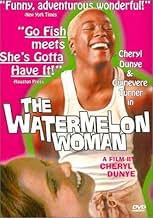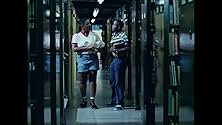CALIFICACIÓN DE IMDb
7.1/10
4.5 k
TU CALIFICACIÓN
Una joven cineasta indaga en la vida de La Mujer Sandía, una actriz negra de los años 30 que interpretaba arquetipos de "mamás".Una joven cineasta indaga en la vida de La Mujer Sandía, una actriz negra de los años 30 que interpretaba arquetipos de "mamás".Una joven cineasta indaga en la vida de La Mujer Sandía, una actriz negra de los años 30 que interpretaba arquetipos de "mamás".
- Dirección
- Guionistas
- Elenco
- Premios
- 4 premios ganados en total
Cheryl Clarke
- June Walker
- (as Cheryl Clark)
Kat L Robertson
- Yvette
- (as a different name)
Opiniones destacadas
The Watermelon Woman (1996) -
I suppose that as a homosexual white British man, I probably wasn't exactly the target audience for this Black, Lesbian film from the U. S., although that in itself goes against my belief that people should explore genres out of their comfort zone, because otherwise they will never know if there is more to life. I could certainly see the appeal of this one for some and the message it was trying to get out. I just didn't like the sex scenes very much (Eek Boobies!).
For the most part, the story was fictionalised and the title character of "The Watermelon Woman" was a vehicle to discuss the injustices of racial bigotry in the world of cinema since the dawn of it's creation and to a certain extent the rest of the time since too.
Although this film did indicate some essence of racism towards white people, for the fact that they allegedly can't understand the persecutions faced by the black community and I wondered if that was deliberate or something that was a missed irony.
The lead character Cheryl played by the writer and director Cheryl Dunye wanted to track down the movements of The Watermelon Woman's past to find out what had happened to her and she studied the golden age of cinema in order to do so. Her journey was quite interesting. I did have to wonder if the whole film might have actually been better if it was presented as a documentary, about actual, real actors of the past that weren't given their dues accordingly.
There was a mention of Hattie McDaniel included here. She was famously snubbed at the Oscars when she went to receive her award for the part of Mammy in 'Gone With The Wind' (1939) and was made to sit in another room and only allowed to enter the main area for the presentation of her statue. Her story was partly covered in the TV series 'Hollywood' (2020) and I'm sure that wasn't delivered wholeheartedly or completely truthfully, because it was a very glamourised interpretation of the early years of Hollywood anyway and it dared to conceive an idea that perhaps these prejudices and things should have been exposed much earlier for their idiocy.
I did say that it might have worked better as a documentary, because I could see that Cheryl was obviously passionate about her message, but the acting really wasn't the best and the film quality was quite poor too, not even just the bits where it was filmed on an old video camera. There were some cheap and odd editing choices and many of the characters were a tad unfriendly while others were perfectly odd including the "Professor" and the C. L. I. T. volunteer (Sarah Schulman).
The style of it actually reminded me of 'Tangerine' (2015), a trans/drag film which was filmed entirely on a smart phone. There were similarities in the direction and the attempt at realism, but this film was far less obnoxious of course, because 'Tangerine' was vile.
It also had a hint of 'Not Another Gay Movie' (2006) too. Those producers, etc must surely have taken inspiration from this film, because the video shop was almost identical.
Not really my thing, but I would definitely recommend it to the appropriate people, because I know some that would appreciate it for its various plus points.
606.19/1000.
I suppose that as a homosexual white British man, I probably wasn't exactly the target audience for this Black, Lesbian film from the U. S., although that in itself goes against my belief that people should explore genres out of their comfort zone, because otherwise they will never know if there is more to life. I could certainly see the appeal of this one for some and the message it was trying to get out. I just didn't like the sex scenes very much (Eek Boobies!).
For the most part, the story was fictionalised and the title character of "The Watermelon Woman" was a vehicle to discuss the injustices of racial bigotry in the world of cinema since the dawn of it's creation and to a certain extent the rest of the time since too.
Although this film did indicate some essence of racism towards white people, for the fact that they allegedly can't understand the persecutions faced by the black community and I wondered if that was deliberate or something that was a missed irony.
The lead character Cheryl played by the writer and director Cheryl Dunye wanted to track down the movements of The Watermelon Woman's past to find out what had happened to her and she studied the golden age of cinema in order to do so. Her journey was quite interesting. I did have to wonder if the whole film might have actually been better if it was presented as a documentary, about actual, real actors of the past that weren't given their dues accordingly.
There was a mention of Hattie McDaniel included here. She was famously snubbed at the Oscars when she went to receive her award for the part of Mammy in 'Gone With The Wind' (1939) and was made to sit in another room and only allowed to enter the main area for the presentation of her statue. Her story was partly covered in the TV series 'Hollywood' (2020) and I'm sure that wasn't delivered wholeheartedly or completely truthfully, because it was a very glamourised interpretation of the early years of Hollywood anyway and it dared to conceive an idea that perhaps these prejudices and things should have been exposed much earlier for their idiocy.
I did say that it might have worked better as a documentary, because I could see that Cheryl was obviously passionate about her message, but the acting really wasn't the best and the film quality was quite poor too, not even just the bits where it was filmed on an old video camera. There were some cheap and odd editing choices and many of the characters were a tad unfriendly while others were perfectly odd including the "Professor" and the C. L. I. T. volunteer (Sarah Schulman).
The style of it actually reminded me of 'Tangerine' (2015), a trans/drag film which was filmed entirely on a smart phone. There were similarities in the direction and the attempt at realism, but this film was far less obnoxious of course, because 'Tangerine' was vile.
It also had a hint of 'Not Another Gay Movie' (2006) too. Those producers, etc must surely have taken inspiration from this film, because the video shop was almost identical.
Not really my thing, but I would definitely recommend it to the appropriate people, because I know some that would appreciate it for its various plus points.
606.19/1000.
This is a very lighthearted film about a black video store clerk (Cheryl Dunye) who wants to make a documentary about an early black actress, known only as The Watermelon Woman." The fact that both Cheryl (Dunye) and the actress are lesbians keeps her going. In fact, in life imitating art, Cheryl finds that The Watermelon Woman was having a lesbian relationship with a white director, and then, she begins a relationship with a white video store customer (Guinevere Turner - American Psycho, Itty Bitty Titty Committee).
The film explored black language, early black actresses, black lesbians, mammies, and watermelon. It even featured an interview with Camille Paglia discussing mammies and watermelon in the context of blacks and Italians, It's nice to see Italians spoken of in something other than the Mob.
Her BFF Tamera (Valarie Walker) is a party girl, but she draws the line at interracial relationships, and that causes a problem for Cheryl.
There are a lot of good scenes throughout the movie, and it made it worthwhile even if the acting wasn't particularly good.
The end credits will surprise you.
The film explored black language, early black actresses, black lesbians, mammies, and watermelon. It even featured an interview with Camille Paglia discussing mammies and watermelon in the context of blacks and Italians, It's nice to see Italians spoken of in something other than the Mob.
Her BFF Tamera (Valarie Walker) is a party girl, but she draws the line at interracial relationships, and that causes a problem for Cheryl.
There are a lot of good scenes throughout the movie, and it made it worthwhile even if the acting wasn't particularly good.
The end credits will surprise you.
There are themes and issues in this film that are obvious, but well defined and used - lesbianism, racism, interracial relationships.... and the ups and downs of working in a video rental shop. All that aside, I have to say that, for me "The Watermelon Woman" is all about obsession. Ah - obsession! The obsession in this case is our leading lady's obsession with a marginal black actress in black & white movies of days long gone by, credited in the films on as "The Watermelon Woman." Who was she... what was her real name... why was she someone to obsess upon? Our lovely leading lesbian begins a journey of body and mind to find the truth of the Watermelon Woman and her life. I tell you obsession is a wondrous thing... when you find something (or, if you're me, many things) to obsess on, your life will be filed with the richness of discovery.. and you'll never be a boring party guest. So, have a look at "The Watermelon Woman," who knows you may just find yourself obsessed. Super sweet.
The Watermelon Woman (1996) was written and directed by Cheryl Dunye. Dunye also stars. The film introduction included the information that this was the first movie to be directed by an openly lesbian Black director.
We learned that Dunye was a film student who wanted to make a documentary about Black women in 1930's movies. Except for movies made for Black audiences, Black women were invariably cast as servants or slaves. Very often their names didn't appear in the movie credits.
Rather than actually doing the documentary, Dunye made a narrative film about a woman (herself) trying to make the documentary. It sounds strange, but it makes sense when you're watching it.
We saw the movie at Rochester's wonderful Dryden Theatre at the George Eastman Museum. It will work well enough on the small screen. It's not a movie for everyone, but it's an important film, and worth seeing.
We learned that Dunye was a film student who wanted to make a documentary about Black women in 1930's movies. Except for movies made for Black audiences, Black women were invariably cast as servants or slaves. Very often their names didn't appear in the movie credits.
Rather than actually doing the documentary, Dunye made a narrative film about a woman (herself) trying to make the documentary. It sounds strange, but it makes sense when you're watching it.
We saw the movie at Rochester's wonderful Dryden Theatre at the George Eastman Museum. It will work well enough on the small screen. It's not a movie for everyone, but it's an important film, and worth seeing.
A cause for celebration, this 20th Anniversary DVD release. The Watermelon Woman was a revelation back in 1996 and it is -- shame on us -- perhaps even more to-the-point today.
Seated by myself at the Film Forum here in NYC, 1996, a gay non-Black guy, I was expecting a variation on the Melvin Van Peebles satire from the early seventies, The Watermelon Man. But a mere five minutes into The Watermelon Woman, I knew I was in the presence of something special, indeed. Here was a tsunami of vivid, fresh air.
Cheryl Dunye -- writer, director, star -- had created something utterly new. Here she was, placing a Black Lesbian at the center, unapologetic about her same-sex longing and needs, about her rich magnetic Blackness, her fierce yet tender femaleness. For me, used to seeing Lesbians or gay men like myself held up for mockery or derision or contempt, it was a revelation to see Lesbians portrayed as just part of the human tapestry, regular people making it through the day, paying bills, falling in and out of lust and love.
For that alone, The Watermelon Woman deserves high praise. But it is about so much more. For Ms. Dunye uses her Blackness to probe an America which has never come to terms with its deep racist history. Ms. Dunye confronts it with wit and candor. Her character is researching a beautiful Black actress from the 1930s, who never received a credit in her films. It's like she never existed, a mere celluloid presence, nothing more.
As she probes deeper into the actress's past, Ms. Dunye begins peeling away her own reality. As both a Lesbian and a Black woman, in an America which marginalizes Lesbians, Blacks, women. She is forced to question assumptions about what it means to be a Lesbian and both a woman and a woman of color.
And here is where The Watermelon Woman becomes as timely as it was back in 1996. For in confronting her own marginalization, Ms. Dunye makes crystal clear why today's Black Lives Matter is so important to today's America. Like any work of art -- and make no mistake, The Watermelon Woman is a work of art, indeed -- meanings change over time. And though Black Lives Matter hadn't yet become a rallying cry, its genesis is inherent in The Watermelon Woman.
Cheryl Dunye, you and The Watermelon Woman are a oner!
Seated by myself at the Film Forum here in NYC, 1996, a gay non-Black guy, I was expecting a variation on the Melvin Van Peebles satire from the early seventies, The Watermelon Man. But a mere five minutes into The Watermelon Woman, I knew I was in the presence of something special, indeed. Here was a tsunami of vivid, fresh air.
Cheryl Dunye -- writer, director, star -- had created something utterly new. Here she was, placing a Black Lesbian at the center, unapologetic about her same-sex longing and needs, about her rich magnetic Blackness, her fierce yet tender femaleness. For me, used to seeing Lesbians or gay men like myself held up for mockery or derision or contempt, it was a revelation to see Lesbians portrayed as just part of the human tapestry, regular people making it through the day, paying bills, falling in and out of lust and love.
For that alone, The Watermelon Woman deserves high praise. But it is about so much more. For Ms. Dunye uses her Blackness to probe an America which has never come to terms with its deep racist history. Ms. Dunye confronts it with wit and candor. Her character is researching a beautiful Black actress from the 1930s, who never received a credit in her films. It's like she never existed, a mere celluloid presence, nothing more.
As she probes deeper into the actress's past, Ms. Dunye begins peeling away her own reality. As both a Lesbian and a Black woman, in an America which marginalizes Lesbians, Blacks, women. She is forced to question assumptions about what it means to be a Lesbian and both a woman and a woman of color.
And here is where The Watermelon Woman becomes as timely as it was back in 1996. For in confronting her own marginalization, Ms. Dunye makes crystal clear why today's Black Lives Matter is so important to today's America. Like any work of art -- and make no mistake, The Watermelon Woman is a work of art, indeed -- meanings change over time. And though Black Lives Matter hadn't yet become a rallying cry, its genesis is inherent in The Watermelon Woman.
Cheryl Dunye, you and The Watermelon Woman are a oner!
¿Sabías que…?
- TriviaAccording to writer/director Cheryl Dunye, much about the character she plays in the film is autobiographical, but the historical references to the Watermelon Woman are fictional: "The Watermelon Woman came from the real lack of any information about the lesbian and film history of African-American women. Since it wasn't happening, I invented it."
- ErroresCheryl (Cheryl Dunye) appears to make a slight fluff of her lines during a dinner scene with Diana, Tamara and Stacey, saying: "Anyway, Diana, if you came to Philadelphia to shape... escape the cold Chicago winters..."
However, as the dinner conversation is deliberately uncomfortable, this is possibly intended.
- Créditos curiososThe film, which seems to be a documentary about Cheryl's search for the obscure actress who inspired her, ends with these printed words: "Sometimes you have to create your own history. The Watermelon Woman is fiction. Cheryl Dunye, 1996"
- Versiones alternativasIn 2016, director Cheryl Dunye's landmark Black Queer Film THE WATERMELON WOMAN was re-released in select theaters and festivals with a pristine 2K HD restoration overseen by the production company 13th Gen, in partnership with Modern Videofilm. The restoration and re-release was sponsored by First Run Features, the Outfest UCLA Legacy Project, and the Toronto International Film Festival. This theatrical tour will be followed by a DVD re-release in early 2017.
- ConexionesFeatured in Fabulous! The Story of Queer Cinema (2006)
Selecciones populares
Inicia sesión para calificar y agrega a la lista de videos para obtener recomendaciones personalizadas
- How long is The Watermelon Woman?Con tecnología de Alexa
Detalles
Taquilla
- Presupuesto
- USD 300,000 (estimado)
- Total en EE. UU. y Canadá
- USD 1,989
- Fin de semana de estreno en EE. UU. y Canadá
- USD 774
- 13 nov 2016
- Total a nivel mundial
- USD 1,989
- Tiempo de ejecución1 hora 25 minutos
- Color
Contribuir a esta página
Sugiere una edición o agrega el contenido que falta




